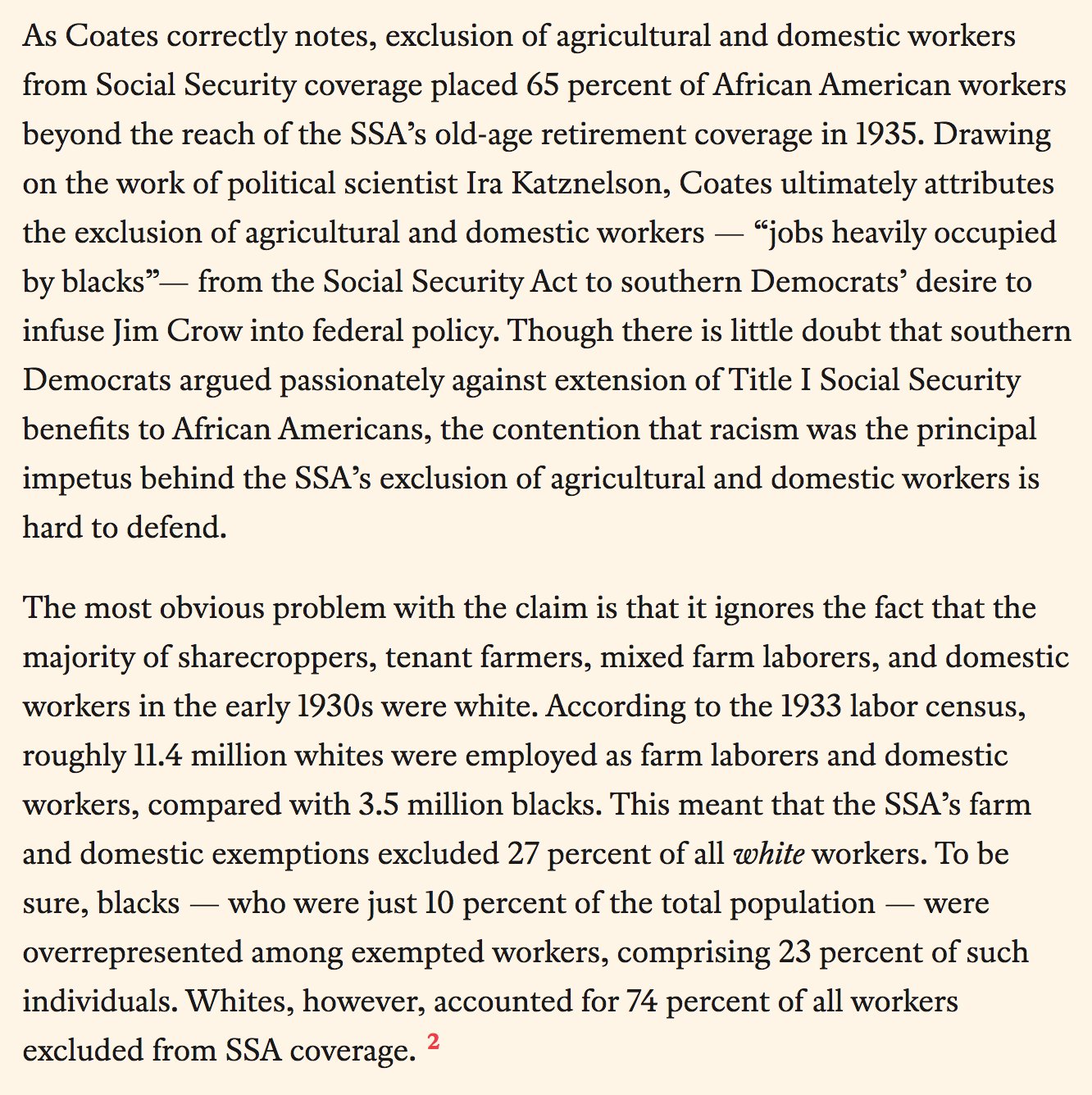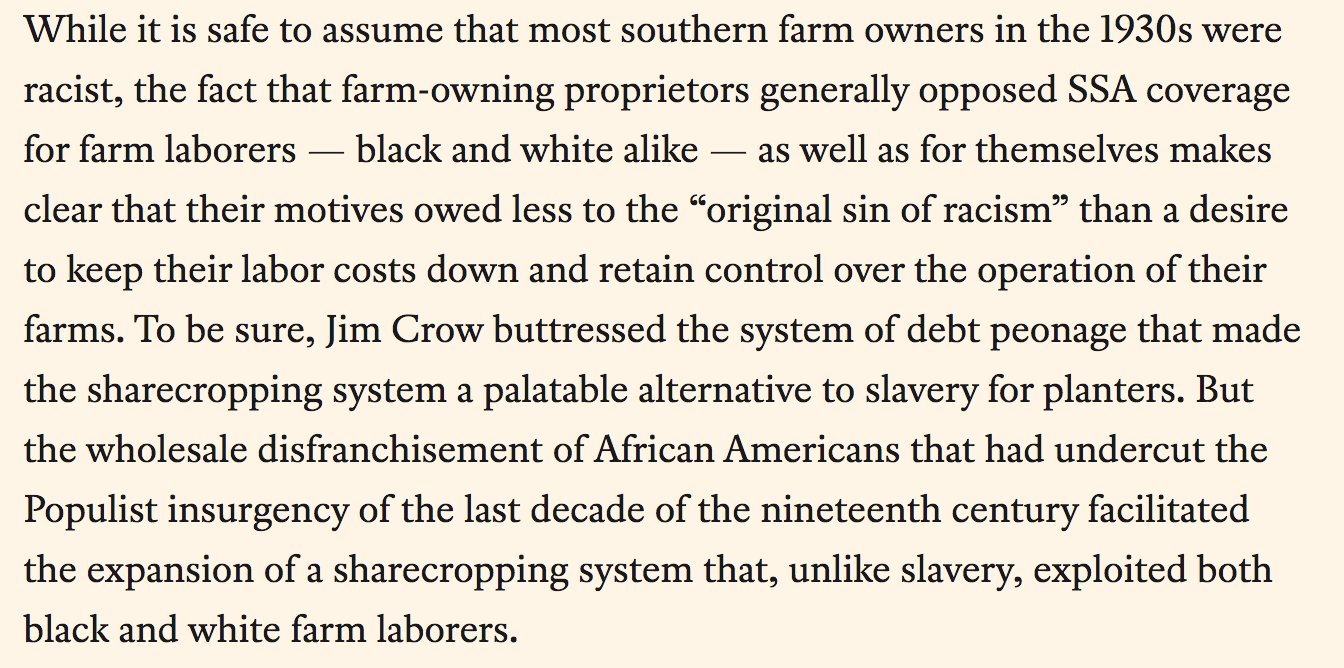What are the stakes that people imagine to be bound up with demonstrating that capitalism in this country emerged from slavery and racism, which are treated as two different labels for the same pathology? Ultimately, it's a race reductionist argument. What the Afro-pessimist types or black nationalist types get out of it is an insistence that we can't ever talk about anything except race. And that's partly because talking about race is the things they have to sell.
If it's not clear already, it's worth thinking about the ways in which the history revision of the 1619 Project is less about understanding history than it is using history to justify a specific approach to defining and dealing with racism in the present. It serves the same purpose as all of the moral idealism pretending to represent justice-- identity politics, intersectionality, reparations-- that exist in the discourse to deter economic redistribution generally, and specifically, in this moment, the mass interracial movement being built by Bernie Sanders.
The current political discourse keeps taking me back to my family visit over the holidays. My sister-in-law-- one of the few people in my life who will talk politics with me-- and I got into a slightly heated discussion on the history of slavery. We were both wrong about a few things. I misstated that blackness was created in response to Bacon's Rebellion, but it was just whiteness, a trans-European identity. Black and red were descriptive. She argued that the Dutch role in the slave trade proved that race and racism were created before the Virginia Slave codes. However, the Dutch role in the slave trade was equivalent to that of a staffing agency, they brought the labor, they had no role in defining the institution in which the labor worked.
The reason that the current discourse keeps taking me back to that conversation is that we were having the underlying argument behind the 1619 Project in reverse. I was making an argument for what it means to address racism in the present on the basis of a history that understands slavery as an economic relationship. She countered with the transhistorical argument popularized by Ta-Nehisi Coates and carried on by the 1619 Project, that slavery and racism are essentially the result of some specific virulence of whiteness. In making her argument she said the quiet parts of this discourse out loud: fixing racism is less about helping people suffering the effects of racism than it is determining the measure of guilt of those purported to be racist.
My understanding of history suggests that economic redistribution impacts the concrete lived experience of systemic racism. Hers seemed to suggest the surprisingly common idea that so many white people are so racist that they'd stop universal programs they need themselves just to deny Black people.
Full disclosure, I haven't read the 1619 Project. I tried, but the best I could do was skim. It's hard to read closely rolling my eyes that much. It doesn't matter. This isn't about the 1619 Project as much as it is about its discursive role. I don't need to read it because I've been exposed to the logic and sense of history of the lead author, Nikole Hannah Jones. It's easier to show our first interaction than write it, at least easier to believe:
Jones, in addition to sharing Coates understanding of slavery also shares his belief that the New Deal was explicitly racist. She discounts the idea that the legal discrimination of Jim Crow might impact the application of the law. She also ignores the material benefits for Black Americans that led many to begin voting consistently Democrat.
Historian Toure Reed addresses this argument in his article, Between Obama and Coates. The relevant portion:


In a 2013 conversation with historian Barbara Fields, Coates, after making clear that he wasn't a student of history, asks if the creation of racism was deliberate. Essentially he was asking if his conception of racism was correct. She answers no. It doesn't stop him from returning to expressing the same understanding that underlies Jones' conception of slavery and racism.
One of the reasons for calling the New Deal racist is to make the point that economic redistribution won't fix racism. This is an argument that Jones has made explicitly about proposed universal programs like Medicare for All. She employs this argument especially in relation to the racial disparity in maternal mortality, which she says wouldn't be addressed by universal healthcare. She's wrong. Anytime it's pointed out that she's making disingenuous arguments against Medicare for All or any other universal policy, she demands that you quote her saying directly that she opposes the policy.
It's important to note that when Jones or anyone saying how inadequate universal policy is for dealing with race, is asked what it means to confront racism, they have no answer. How could they? Think about it: these people profess to want justice for a history for Black people defined by dispossession. Yet, at a time where $15/hour is still a raise for 40% of Black workers, they pretend there's something as important as the material deprivation that raise would challenge.
It's not clear, but what they might mean by confronting racism is confronting bias, or, most often, the bias they project on usually white strangers. They conflate that projected bias with the systemic deprivation that racism was created to ensure and then focus on that bias. They also universalize the explicit bias of individuals to say, "see, white people are so racist they'd die before they let the government help Black people."
The race reductionists don't seem to recognize the irony of their arguments. The life expectancy has dropped for the nation as a whole every year since 2014 because of the number of white people dying from suicide and drug overdoses. There's an old bromide that the reason white people so fear becoming minorities in the US is that they don't want to be treated the way that minorities have. The joke was supposed to be that no one cared about revenge, not that we couldn't wait for revenge. While not active participants in these deaths of desperation, the race reductionists see the deaths as the debt of whiteness; the consequence for white racism.
Rather than accept the depravity of being so completely apathetic about so many deaths, the race reductionists justify their indifference through dehumanization. They generalize to all (poor) white people the expressed sentiments of clearly unwell individuals. They imply that basic biological imperatives like survival and protection of their young cease to exist because of the strength of white bias. These race reductionists would vilify and excoriate any white person expressing similar thoughts about any Black person.
This is one of the reasons I call these arguments of moral idealism the white supremacist argument in Black face. They are opposing sides of the same coin. Neither results in the material improvement of anyone suffering from racism, while deterring the possibility of the type of movement that historically has. Both start with the presumption that there is a unique privilege to being born white. Heads, you embrace it, tails, you reject it. The secret is that the arbiters of this discourse treat anyone who attempts to reject their whiteness as if they are embracing it. Rachel Dolezal should be the poster child for this philosophy. She gave up the social construct of whiteness to go work for and be a part of the community she claimed. If not that, what does it mean for someone to reject their white privilege?
When Adolph Reed Jr. says that these arguments against universal programs and economic redistribution are a class argument, this is what he means. The response to the Sanders campaign promoting an endorsement of Bernie by Joe Rogan should make it completely clear that these are deliberate arguments for maintaining the status quo.
Comedian Rogan, whose podcast has one of the consistently largest audiences in the country, complimented Bernie's moral convictions. The campaign promoted this as an endorsement, which was spun as being the same as promoting white nationalism and transphobia, which is beyond ridiculous. I feel confident suggesting that anyone advocating this idea is promoting a socialized idea rather than one born from watching the show. I've only watched 3 episodes. What I observed was an interviewer with thoughtful questions who seemed to listen closely to his guests; far from promoting white nationalism or transphobia. The transphobia charge came in response to him speaking out specifically against a trans fighter who didn't reveal her transition before fracturing the skull of another MMA fighter. What makes these depictions of Rogan particularly ridiculous is that he's a Democrat voting liberal, as he talked about following the 'outrage':
He's not, but what if Rogan actually were the transphobic white supremacist that people are claiming him to be? Bernie Sanders is promoting a modernized legislative equivalent of Martin Luther King's Poor People's Campaign. If Rogan is endorsing that platform isn't that good? If having white nationalists and transphobes fight to ensure that all Black people, all trans people have healthcare and better economic security isn't the point, what is? It would seem that the barrier to universal programs may not be the white supremacists after all, but the people claiming all whites are white supremacists who we need to fix to make universal programs possible.
cross posted at Medium






Comments
Post a Comment